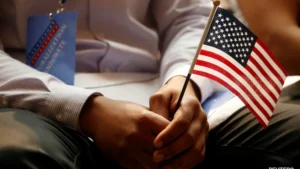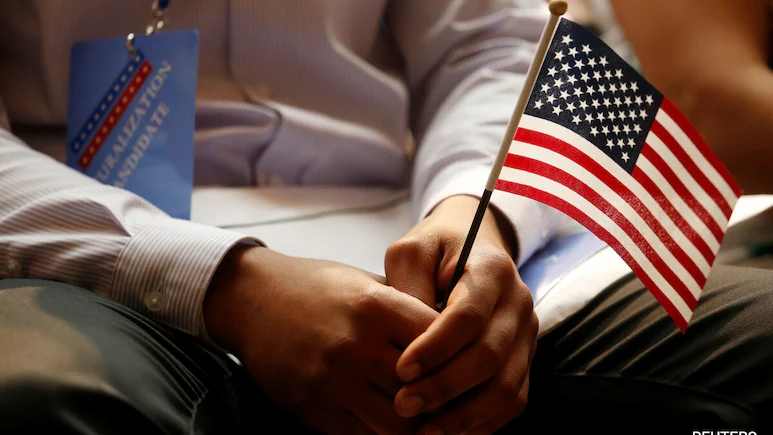In an unprecedented move, Indian and Chinese international students have united to file a lawsuit against the Trump administration’s abrupt termination of F-1 visas for online learners. This legal battle highlights the turmoil faced by thousands of students amid shifting U.S. immigration policies.
The Trump administration’s July 2020 directive, which barred international students from remaining in the U.S. if their universities shifted to online-only classes due to COVID-19, sparked global outrage. Now, students from India and China—two of the largest groups affected—are challenging the policy in court, calling it “discriminatory” and “a violation of due process.” This post explores the lawsuit’s implications, the students’ demands, and what this means for the future of international education in America.
Indian & Chinese Students Sue Trump Administration Over F-1 Visa Termination: A Fight for Justice
What Prompted the Lawsuit?
In July 2020, U.S. Immigration and Customs Enforcement (ICE) announced:
- F-1 Visa Rule: International students enrolled in fully online programs must leave the U.S. or transfer to schools offering in-person classes.
- Threat of Deportation: Failure to comply risked deportation and visa revocation.
The policy blindsided over 1 million international students, including 200,000+ from India and 370,000+ from China. Universities like Harvard and MIT swiftly sued the administration, forcing a partial rollback. However, the damage was done—many students faced anxiety, financial losses, and disrupted academic journeys.
Why Indian and Chinese Students Are Leading the Charge
1. Shared Grievances, Collective Action
- Indian Students: Make up nearly 20% of all international students in the U.S., often pursuing STEM degrees.
- Chinese Students: Largest group (35%), critical to university revenues.
- Common Struggles: Both groups pay high tuition fees, rely on post-study OPT visas, and faced travel bans during COVID-19.
2. Legal Arguments in the Lawsuit
- Discrimination: Alleging the policy targeted Asian students amid U.S.-China tensions and India’s COVID-19 crisis.
- Violation of APA: Accusing ICE of bypassing the Administrative Procedure Act, which mandates public notice before policy changes.
- Economic Harm: Seeking compensation for sudden relocation costs, lost housing deposits, and mental distress.
3. Symbolic Solidarity
Despite geopolitical rivalry between India and China, students are bridging divides to fight for their rights. “This isn’t about nationality—it’s about fairness,” said a petitioner from Delhi.
Broader Implications: U.S. Universities and Global Education
1. Financial Blow to Universities
International students contribute $45 billion annually to the U.S. economy. Policies seen as hostile could drive them to Canada, Australia, or the UK.
2. Erosion of U.S. Soft Power
The lawsuit underscores declining trust in America’s “land of opportunity” image. Enrollment from India dropped 13% in 2022, while Canada saw a 119% surge.
3. Biden’s Response: Too Little, Too Late?
While the Biden administration revoked the policy in 2021, students demand accountability. “We lost years of our lives to bureaucratic cruelty,” said a Chinese plaintiff.
Key Players and Legal Strategies
- Plaintiffs: Over 1,000 students from India, China, and other nations.
- Lawsuits Filed: Multiple cases consolidated in federal courts, citing constitutional violations.
- Support from Universities: Amicus briefs filed by Ivy League schools backing the students’ claims.
-
Indian & Chinese Students Sue Trump Administration Over F-1 Visa Termination: A Fight for Justice

What’s at Stake?
- Precedent for Future Policies: A win could limit executive overreach in immigration decisions.
- Compensation: Students seek reimbursement for losses totaling millions of dollars.
- Visa Security: Clarification on protections for international students during crises.
Global Reactions and Student Voices
- India: Petitions in Parliament highlighted the issue; families criticized the “betrayal” after investing lakhs in U.S. education.
- China: State media slammed the policy as “xenophobic,” while students shared stories of overnight homelessness.
- U.S. Activists: “This lawsuit is about basic human dignity,” said an immigration rights advocate.
Conclusion: A Landmark Battle for International Students
The Indian and Chinese students’ lawsuit is more than a legal challenge—it’s a fight for the soul of global education. As courts weigh in, the outcome could redefine how the U.S. treats its international scholars. For now, these students’ resilience sends a powerful message: education cannot be held hostage to politics.
High-Searching SEO Keywords (English):
F-1 visa termination lawsuit, Indian Chinese students sue Trump, ICE international student rules, COVID-19 visa policy, US international student crisis, Trump administration deportation, Harvard MIT lawsuit, OPT visa impact, Biden immigration policy, foreign students legal rights.
High-Searching Keywords (Hindi):
F-1 वीज़ा नीति, भारतीय छात्र मुकदमा, ट्रम्प प्रशासन विवाद, चीनी छात्र संयुक्त मामला, अंतरराष्ट्रीय छात्र समस्याएं, कोविड-19 वीज़ा नियम, अमेरिका शिक्षा संकट, ICE नीति विवाद, बिडेन प्रतिक्रिया, अंतरराष्ट्रीय छात्र अधिकार।
Share this post to amplify student voices! Do you think the U.S. should compensate affected international students? Comment below. 🌍📚

Looking for second-hand? thrifting near me We have collected the best stores with clothes, shoes and accessories. Large selection, unique finds, brands at low prices. Convenient catalog and up-to-date contacts.
русское порно с разговорами русское порно сын
Want to have fun? porno girl Watch porn, buy heroin or ecstasy. Pick up whores or buy marijuana. Come in, we’re waiting
Новые актуальные промокод iherb на заказ для выгодных покупок! Скидки на витамины, БАДы, косметику и товары для здоровья. Экономьте до 30% на заказах, используйте проверенные купоны и наслаждайтесь выгодным шопингом.
купить курсовую онлайн курсовая работа на заказ цена
займы онлайн без отказа https://zaym24online.ru
быстрый займ на карту онлайн займ онлайн
перевод и заверение документов сайты бюро переводов
cocaine prague prague plug
buy mdma prague https://cocaine-prague-shop.com
prague drugs buy mdma prague
buy drugs in prague weed in prague
prague plug buy cocaine prague
cocain in prague from brazil prague drugs
Нужна лабораторная? лабораторный работы на заказ Индивидуальный подход, проверенные решения, оформление по требованиям. Доступные цены и быстрая помощь.
Нужен чертеж? https://chertezhi-kurs.ru выполним чертежи для студентов на заказ. Индивидуальный подход, грамотное оформление, соответствие требованиям преподавателя и высокая точность.
Нужна презентация? заказать презентацию недорого Красочный дизайн, структурированный материал, уникальное оформление и быстрые сроки выполнения.
Нужна презентация? https://generator-prezentaciy.ru Создавайте убедительные презентации за минуты. Умный генератор формирует структуру, дизайн и иллюстрации из вашего текста. Библиотека шаблонов, фирстиль, графики, экспорт PPTX/PDF, совместная работа и комментарии — всё в одном сервисе.
Проблемы с откачкой? насос для откачки воды из подвала сдаем в аренду мотопомпы и вакуумные установки: осушение котлованов, подвалов, септиков. Производительность до 2000 л/мин, шланги O50–100. Быстрый выезд по городу и области, помощь в подборе. Суточные тарифы, скидки на долгий срок.
значки под печать изготовление значков логотипов
изготовление значков с логотипом брендирование значков
значки свой дизайн на заказ значки на лацкан изготовление
joszaki regisztracio joszaki
joszaki regisztracio joszaki
pronostic foot gratuit https://parifoot-afrique.com
1xbet africain paris sportif foot
1xbet cameroun apk telecharger 1xbet
сеть фитнес клубов фитнес клуб тренировка
Курсы ЕГЭ химия https://courses-ege.ru
telecharger 1xbet cameroun 1xbet afrique apk
Актуальная kraken onion ссылка публикуется в официальных телеграм каналах с PGP верификацией подписи администрации для подтверждения подлинности адреса маркета.